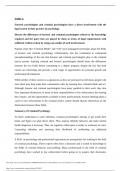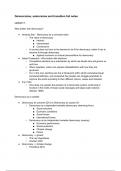Lecture notes
Unit 5 applications of criminal and forensic psychology 2024
- Institution
- PEARSON (PEARSON)
unit 7 applications of criminal and forensic psychology Achieved Distinction with these notes. Covers all three questions, including offender profiling, top down and bottom up approach, biological and non-biological approach, treatment programs, and more.
[Show more]












